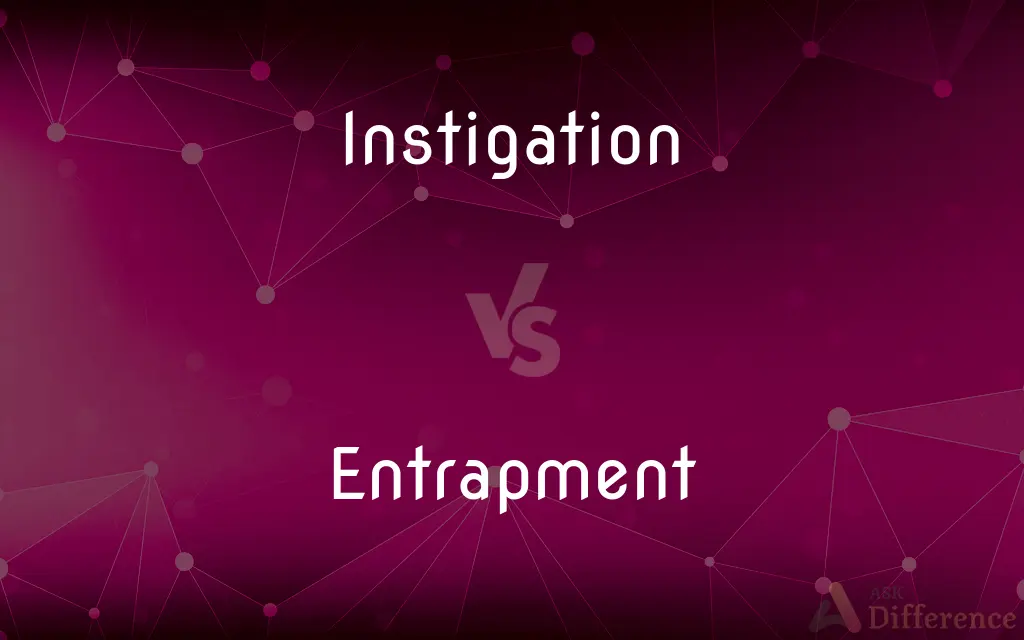Instigation vs. Entrapment — What's the Difference?
By Maham Liaqat & Urooj Arif — Updated on April 8, 2024
Instigation involves initiating or provoking an action or event, with intent to cause something to happen, whereas entrapment is a legal defense where an individual is induced by law enforcement to commit a crime they would not have otherwise committed.

Difference Between Instigation and Entrapment
Table of Contents
ADVERTISEMENT
Key Differences
Instigation refers to the act of urging, provoking, or inciting someone to take a particular action, often with the intention of causing a specific outcome or event. It involves a person (the instigator) encouraging or persuading another to act in a way that fulfills the instigator's objectives. On the other hand, entrapment is a concept in law where an individual argues that they were induced or persuaded by law enforcement agents to commit a crime that they would not have otherwise contemplated, aiming to challenge the validity of criminal prosecution.
Instigators can be found in various contexts, from personal relationships to political movements, where they seek to influence others' behaviors or decisions to achieve a desired effect. Entrapment, however, is specifically related to legal scenarios where law enforcement's overreach is questioned, particularly in cases where their involvement may have coerced an individual into committing illegal acts.
The ethical implications of instigation can vary, ranging from morally neutral or positive (e.g., instigating social change) to negative (e.g., inciting violence). In contrast, entrapment is inherently problematic from a legal and ethical standpoint, as it involves law enforcement engaging in potentially deceptive practices that can lead to someone committing a crime they would not have otherwise committed.
Instigation does not inherently involve legality or law enforcement but pertains to the broader concept of influence and persuasion across all aspects of society. Entrapment is a legal defense used in court to argue that the defendant was unjustly induced to commit the crime, directly involving law enforcement practices and legal judgments.
The outcomes of instigation depend on the individuals' actions and the context, which can range from benign to significant societal impact. Entrapment outcomes typically focus on legal consequences, including the potential dismissal of charges if it is proven that the defendant was entrapped, highlighting the judicial process's role in determining the fairness of law enforcement tactics.
ADVERTISEMENT
Comparison Chart
Definition
Act of urging or provoking someone to take action.
Legal defense where one is induced by law enforcement to commit a crime.
Context
Broad, including personal, social, and political realms.
Specifically legal, involving law enforcement tactics.
Ethical Implications
Can vary from neutral to negative, depending on intent and outcome.
Considered problematic, questioning the ethics of law enforcement methods.
Legal Relevance
May not directly involve legal issues unless leading to unlawful acts.
Directly related to legal proceedings and defenses.
Outcomes
Varies widely, from insignificant changes to major societal impacts.
Legal consequences, potentially affecting the outcome of criminal cases.
Compare with Definitions
Instigation
Catalyst for events.
Their debate was the instigation for a broader community discussion.
Entrapment
Basis for challenging prosecution.
Entrapment was used as a defense in the high-profile case.
Instigation
Influence to act.
Peer pressure often serves as an instigation for questionable decisions.
Entrapment
Legal defense strategy.
The defendant claimed entrapment, arguing the undercover cop encouraged the illegal act.
Instigation
Encouraging specific behavior.
His speech served as an instigation for reform.
Entrapment
Ethical concern in policing.
The seminar discussed entrapment and its implications for justice.
Instigation
Motivation behind actions.
The director's encouragement was the instigation for the project's completion.
Entrapment
A factor in dismissing charges.
The charges were dismissed due to evidence of entrapment.
Instigation
Act of provoking action.
The protest was the result of instigation by activist groups.
Entrapment
Inducement by law enforcement.
The operation was criticized for potentially leading to entrapment.
Instigation
To initiate or bring about, often by inciting
Instigate a public discussion of the issue.
Instigate an uprising.
Entrapment
Entrapment is a practice in which a law enforcement agent or agent of the state induces a person to commit a "crime" that the person would have otherwise been unlikely or unwilling to commit. It "is the conception and planning of an offense by an officer or agent, and the procurement of its commission by one who would not have perpetrated it except for the trickery, persuasion or fraud of the officer or state agent".Police conduct rising to the level of entrapment is broadly discouraged and thus, in many jurisdictions, is available as a defense against criminal liability.
Instigation
To urge on; goad
Tried to instigate the people to revolt.
Entrapment
To catch in or as if in a trap.
Instigation
The act of instigating, or the state of being instigated; incitement; especially to evil or wickedness.
Entrapment
To lure into danger, difficulty, or a compromising situation.
Instigation
The act of instigating, or the state of being instigated; incitement; esp. to evil or wickedness.
The baseness and villainy that . . . the instigation of the devil could bring the sons of men to.
Entrapment
(Law) To induce (someone) into performing an otherwise uncontemplated criminal act for the sole purpose of providing the basis for a prosecution.
Instigation
The verbal act of urging on
Entrapment
The state of being entrapped.
The entrapment of the victims in the wreckage made rescue difficult.
Instigation
Deliberate and intentional triggering (of trouble or discord)
Entrapment
(legal) Action by law enforcement personnel to lead an otherwise innocent person to commit a crime, in order to arrest and prosecute that person for the crime.
A detective asking you to buy illegal marijuana for a dying man would be police entrapment.
Entrapment
(chemistry) A method of isolating specific cells or molecules from a mixture, especially by immobilization on a gel.
Entrapment
A defense that claims the defendant would not have broken the law if not tricked into doing it by law enforcement officials
Common Curiosities
How does entrapment differ from instigation?
Entrapment is a legal concept where an individual is induced by law enforcement to commit a crime they would not normally commit, whereas instigation is a broader term for encouraging someone to act, not limited to legal contexts.
How can someone defend against a charge using entrapment?
To use entrapment as a defense, the defendant must show that law enforcement induced the crime and that they were not predisposed to commit such a crime without the law enforcement’s persuasion.
Can instigation lead to legal consequences?
Yes, if instigation involves urging someone to commit illegal acts, it can have legal consequences for the instigator.
Is entrapment considered unethical?
Entrapment is often viewed as unethical because it involves law enforcement inducing someone to commit a crime, potentially violating their rights.
What are the implications of instigation in social movements?
Instigation can play a pivotal role in social movements, serving as a catalyst for change by motivating individuals or groups to take action.
What is instigation?
Instigation is the act of encouraging or provoking someone to take a specific action, often aiming to achieve a particular outcome.
What role does intent play in instigation and entrapment?
Intent is crucial in both; in instigation, it refers to the purpose behind encouraging an action, while in entrapment, it involves the intention of law enforcement to induce criminal behavior.
Are there legal protections against entrapment?
Yes, legal systems in many jurisdictions offer protections against entrapment, recognizing it as a valid defense that can lead to the dismissal of charges.
Can instigation be positive?
Yes, instigation can be positive, such as when it encourages beneficial actions or social change.
How is entrapment determined in court?
Entrapment is determined based on evidence showing that law enforcement induced the criminal action and the defendant's lack of predisposition to commit the crime independently.
Share Your Discovery

Previous Comparison
Weasel vs. Marten
Next Comparison
Sphinx vs. ManticoreAuthor Spotlight
Written by
Maham LiaqatCo-written by
Urooj ArifUrooj is a skilled content writer at Ask Difference, known for her exceptional ability to simplify complex topics into engaging and informative content. With a passion for research and a flair for clear, concise writing, she consistently delivers articles that resonate with our diverse audience.
















































